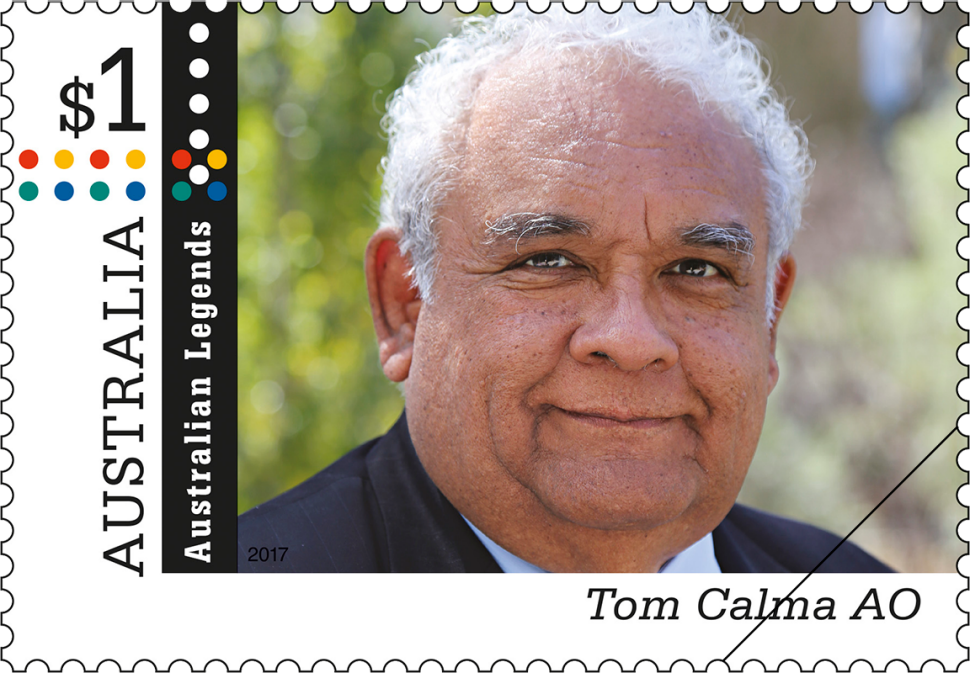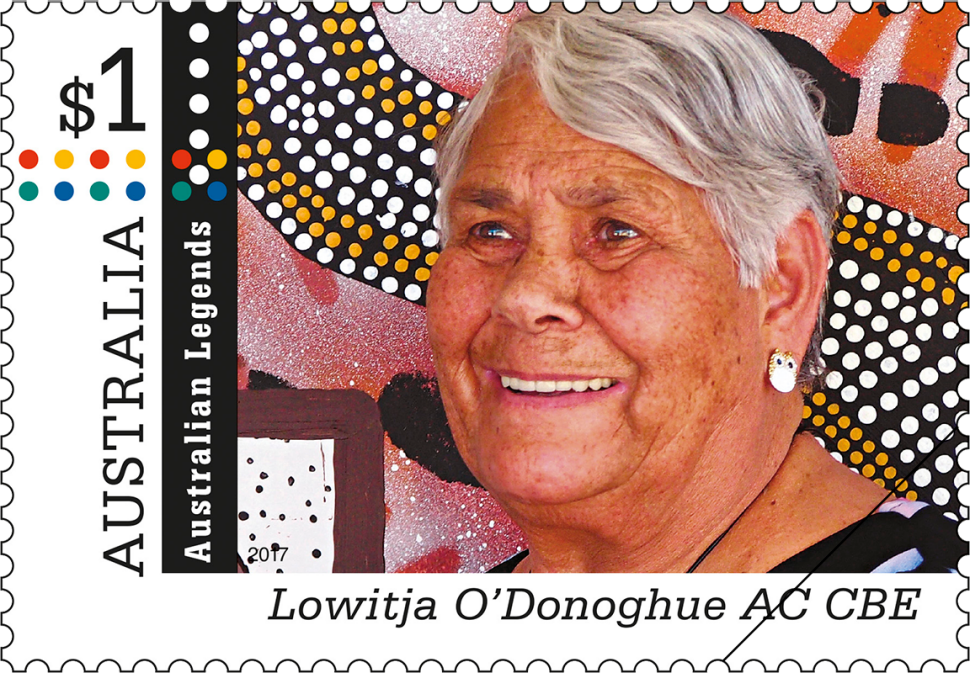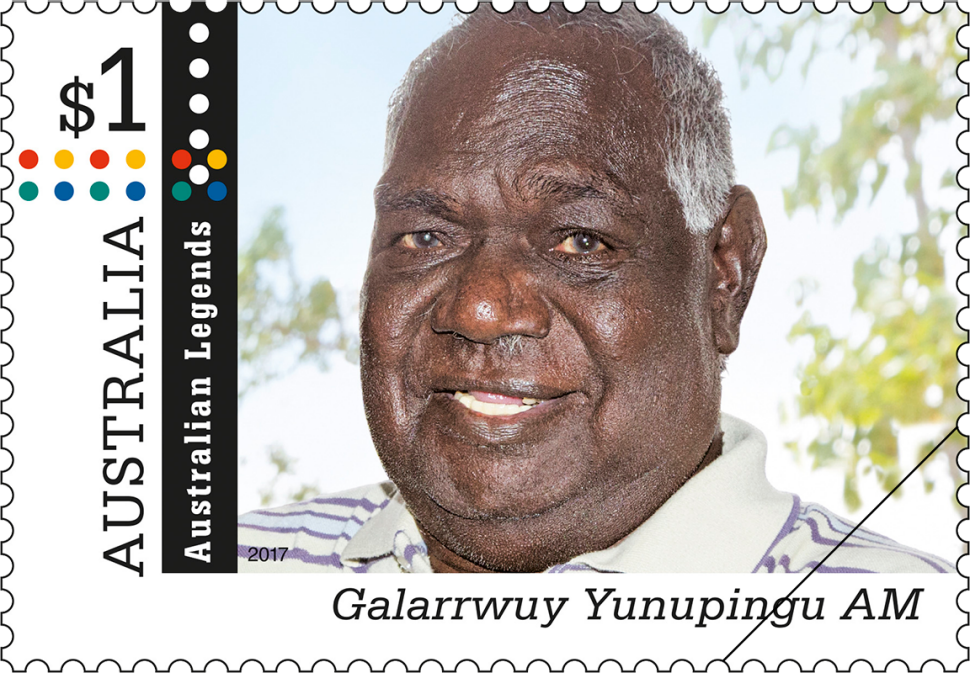| Visual | Audio |
| Iconic Australian landscapes shown including vast desert landscape, Uluru, kangaroo. |
Traditional aboriginal music plays Birds crow Voiceover: Across this land, for Aboriginal and Torres Strait Island people, culture, language and country are central to their existence. Their relationship with those core values has travelled through time and across generations. It is the cornerstone to their very survival and has always been the driving force for those leaders who have a deep passion and commitment in the pursuit of equality, inclusion and justice. |
| Images fade to black before Lowitja O'Donoghue AC CBE is shown sitting in a room. Name slate appears with text- Lowitja O’Donoghue AC CBE Australia Post Legend. |
Lowitja O'Donoghue: I only want to be remembered for [having] giving of my best to advance the life of my people. |
| Video of Tom Calma also sitting is now showing. Name slate appears with text- Tom Calma AO Australia Post Legend |
Tom Calma: It's what we as Aboriginal, Torres Strait Islander people see as our mantra, you know. Do it with us, not for us, which is really important. |
| Justin Mohamed speaking to camera. Name slate appears with text- Justin Mohamed CEO Reconcilliation Australia. Various images of Lowitja, Tom and Galarrwuy. |
Justin Mohammed: To have a legend series for Aboriginal Torres Strait Islander people and if you notice these three in particular, they haven't graced the sporting fields and had their legend status through that. Their legendary status has come through a lot of other areas which sometimes gets or often gets overlooked |
| Back to Justin Mohamed speaking to camera. |
by Australians. That there has been a fight, a struggle, there's been a time when leadership and people have to stand up and be leaders, think of new ways, and these three typify all that. |
| Images of Lowitja O'Donoghue shown while Justin Mohamed is also speaking to camera. |
With Lowitja, breaking the ceiling of Aboriginal leadership and women leadership and in a time when women weren't even in the broader Australia were seen to have the opportunities that there are today and also have the positions that there are today and that's something which was not unheard of but in her walk of life and what she put her hand up to do in the public life and right through to her leadership is something which wasn't a common thing seen and done and she opened a lot of doors or paved a lot of paths which people are following in that now and probably don't really understand why it may be that those opportunities exist. They exist because of people like Lowitja. |
| Lowitja O'Donoghue speaking to camera with images of her displayed also |
Lowitja O'Donoghue: I was just doing what I've always done. I knew nothing about the glass ceiling. It was my job and I always did things well. From back in the nursing days and every nurse who knows me will say that I was the best nurse on the ward and I say I was too. |
| Justin Mohammed speaking to camera and photos of Lowitja O'Donoghue also appear |
Justin Mohammed: Her career, from a nurse right through to where she became a national leader with ATSIC and the influence that she had, not only just Aboriginal and Torres Strait Islander issues but national issues, I think is remarkable and an inspiration for many people my generation. I know many women in my generation, she really kind of was a trailblazer. |
| Lowitja O'Donoghue speaking to camera as photos of her career are shown. |
Lowitja O'Donoghue: ATSIC, Aboriginal and Torres Strait Island Commission, became a national organisation with regional council meetings and so on. It was the first time that Aboriginal people had actually been making decisions, had a [badge] at making decisions for themselves and so I thought that was something that I wanted to achieve. |
| Images of Lowitja O'Donoghue’s career shown. |
Justin Mohammed: She really came into a time where she's - enough was enough. Nothing's going to stand in my way. |
| Lowitja O'Donoghue speaking to camera. |
Lowitja O'Donoghue:I haven't ever called myself an activist, but I'm going to actually do the things that I need to do to bring about change for my people. |
| Justin Mohammed speaking to camera while images of Lowitja O'Donoghue's career shown. |
Justin Mohammed: It's to do with what the general world thinks of Aboriginal people and what we can achieve or what as a woman - I'm going to defy the odds with this. |
| Lowitja O'Donoghue speaking to camera as photos of her career are shown. |
Lowitja O'Donoghue:The Queen knows I'm a Republican because the last time I was at Buckingham Palace, I said to her I am leaving in the morning, Ma'am, for the first flight in the morning because the republic [unclear] republican - I know that, she said [laughs]. So I'm going back for that. So she knows I'm a republican. She had no difficulties about that. |
| Traditional Indigenous music plays with traditional images shown before images of Galarrwuy Yunupingu’s career are shown. Justin Mohammed speaking to camera with images of Galarrwuy Yunupingu’s career shown. |
Justin Mohammed: With Galarrwuy he's - that connection to the land isn't just what physically or - it provides or his physical connection to it. There is a real spiritual connection. I mean he lives there, he's always lived there, on country. |
| Tom Calma speaking to camera with images of Galarrwuy Yunupingu’s career shown. |
Tom Calma: When we look at Galarrwuy Yunupingu, you know he has been a real champion for Indigenous rights and particularly land rights and he never ever waned from this and that is to see land and culture and language as being paramount to us as Aboriginal Torres Strait Islander people's existence. |
| Footage of Galarrwuy Yunupingu speaking on stage at Garma festival. |
Galarrwuy Yunupingu: [Land Rights Act] is a big thing. Aboriginal people think that land is ours. We [have to make it right]… Justin Mohammed: Galarrwuy brought land rights and connection to land and how important that is as far as advancing anything in the Aboriginal and Torres Strait Islander space and having that dialogue is quite remarkable, even to the point now we see Garma, the festival up there. It is filled with people who make that track and journey and |
| Justin Mohamed speaking to camera. |
CEOs of the top companies take time out of their diaries because they know that it's a very important part of the dialogue which takes place on country, not in a hotel or in Parliament but on country. |
| Tom Calma speaking to camera along with images of Galarrwuy. |
Tom Calma: Galarrwuy is a real champion and a very worthy recipient. I remember just in 2015 when he was awarded his honorary doctorate from the University of Melbourne. It was a very moving ceremony, to see an official conferment ceremony of an honorary doctorate to somebody in a very culturally based and sound area - on his own country, with his own people, which was just such a privilege to be part of. |
| Image of Tom Calma followed by Justin Mohamed speaking to camera. More images of Tom Calma during his career shown. |
Justin Mohammed: Tom is - he's been a leader in this, right on the front line of really challenging how the status quo has dealt with Aboriginal and Torres Strait Islander with their health and their health determinants around housing and education. He's been able to work between how the government sees things, but what more importantly putting up some really good solutions and bringing people in to say we need to work on this together to right the wrongs of generations. |
| Tom Calma speaking to camera followed by footage of Tom Calma walking through University of Canberra. |
Tom Calma: It's all about achieving equality and opportunity and so there's still a big gap before we can say that yes, we are on par in education and health in terms of employment outcomes. They're the three big indicators and we've got to get them right if we're going to see us thrive as a society. |
| Justin Mohammed speaking to camera with images and video of Tom Calma shown. |
Justin Mohammed: He's been able to ensure that the social justice of Aboriginal and Torres Strait Islander peoples and the health determinants isn't lost on the bureaucracy and to articulate that with his social justice report, but move that into a campaign like Close the Gap and not only just for Aboriginal and Torres Strait Islander people, bringing non-Indigenous people to come on board with that and say look, we've got this - this issue affects all of Australians. |
| More images of Tom before we see him speaking to camera. |
Tom Calma: We're seeing a global movement to train up Indigenous peoples to take on leadership roles into the future. We will see Aboriginal and Torres Strait Islander people really excel in these areas in the coming year. |
| Justin Mohammed speaking to camera. |
Justin Mohammed: This issue has been I think a great legacy that he has - obviously that we've seen has continued on and the campaign is probably one of the longest campaigns running. |
| Tom Calma speaking to camera with images of his career shown. |
Tom Calma: We'll see things a little bit differently and we'll talk from a firsthand experience versus somebody else's interpretation about us. We just need to address some of the real big challenges like the Close the Gap targets, but to do those targets in conjunction with Aboriginal and Torres Strait Islander people and to be able to as a society, as a nation, walk together. |
Image of the Lowitja O'Donoghue stamp.
|
Voiceover: Australia Post honours these outstanding Australians. Lowitja O'Donoghue, Galarrwuy Yunupingu and Tom Calma. |
| Text shown on screen while Aboriginal music is playing ‘Tom Calma, Lowitja O’Donoghue and Galarrwuy Yunupingu have led the way to significant change in Indigenous rights. This year we commemorate 50 years since the 1967 referendum. Let’s all play a part in the next big steps of our nation’s reconciliation journey.’ |
|
| Australia Post logo shown, then moves up slowly with text ‘Australia Post Australian Legends award 2017’ appearing. |
Voiceover: We celebrate the Australia Post Australian Legends Award for 2017. |
The Australia Post Australian Legends Award recognises individuals who have shaped Australian society and identity in a variety of positive ways. In 2017, we honour three remarkable Indigenous leaders: Tom Calma, Lowitja O’Donoghue and Galarrwuy Yunupingu.
These highly respected elders have been tireless in their life-long efforts to improve social and economic outcomes for Aboriginal and Torres Strait Islander peoples. Together, their work has spanned the areas of land rights, economics, self-determination, health, welfare, education and reconciliation.
Since its inception, the Australia Post Australian Legends Award has been announced to coincide with Australia Day. Out of respect for those who associate 26 January with the colonisation of Aboriginal and Torres Strait Islander people, this year it will be awarded in May. This timing coincides with the 50th anniversary of the 1967 referendum, which saw more than 90 per cent of Australians vote “yes” for constitutional change that would see Indigenous people subject to federal rather than state laws – just like every other Australian citizen – and give them visibility through inclusion in the census. This year also marks the 25th anniversary of the Mabo High Court decision, which saw Native Title replace the misnomer of terra nullius (the legal doctrine that declared that Indigenous lands belonged to no one prior to European settlement).
Tom Calma AO
Thomas Edwin (“Tom”) Calma was born in Darwin, Northern Territory, in 1953. He is an elder of the Kungarakan people and member of the Iwaidja tribal group, whose traditional lands are south-west of Darwin and on the Cobourg Peninsula in the Northern Territory.
For more than 40 years he has championed the rights, responsibilities and welfare of Aboriginal and Torres Strait Islander peoples. Between 2004 and 2010 he was Aboriginal and Torres Strait Islander Social Justice Commissioner at the Australian Human Rights Commission, and also Race Discrimination Commissioner for most of that time.
Calma has been involved in Indigenous affairs at local, community, state, national and international levels, contributing to the wellbeing of Indigenous people most particularly in the areas of health, education, reconciliation and economic development. He was active in forming the Close the Gap campaign, and delivered the formal response on behalf of Aboriginal people to the government’s National Apology to the Stolen Generation.
He is co-chair of Reconciliation Australia and a director of the Australian Indigenous Leadership Centre (AILC), the board of which he joined in 2009 and chaired from 2011 to 2014. The federal government has named AILC a key in closing the gap between Indigenous and non-Indigenous Australians.
Calma has received honorary doctorates from Charles Darwin, Curtin and Flinders Universities. In January 2014, Professor Calma was appointed chancellor of the University of Canberra, making him the first Aboriginal or Torres Strait Islander man to hold the position of chancellor of any Australian university. He was named ACT Australian of the Year in 2013 and made an Officer of the Order of Australia in 2012 in recognition of his “distinguished service to the Indigenous community as an advocate for human rights and social justice, through contributions to government policy and reform, and to cross-cultural understanding”.
Lowitja O’Donoghue AC CBE
Lowitja O’Donoghue was born in South Australia in 1932, her mother being Yankunytjatjara and her father Irish. She is a member of the Stolen Generation, taken from her mother at age two to be raised by the United Aborigines Mission.
Following her initial training as a nurse she was refused entry to the Royal Adelaide Hospital to continue her studies because of her Aboriginality. This led to her active involvement with the Aboriginal Advancement League, joining with other Aboriginal people, trade unions and churches to agitate for the rights of Aboriginal people to enter professions and take up apprenticeships.
Following her contestation of the ban, she became the first Aboriginal trainee nurse at the Royal Adelaide Hospital in 1954. She graduated and became a charge sister at the hospital, where she stayed for 10 years.
During the 1960s, she employed her nursing skills outside Australia, working in Assam, India, with the Baptist Overseas Mission. Her role in the area of health is also evident in her being the inaugural chair of the Cooperative Research Centre of Aboriginal and Tropical Health (2003–09) and CRC for Aboriginal and Torres Strait Islander Health.
She joined the federal Department of Aboriginal Affairs following the 1967 referendum, and in 1975 became the director of the South Australian region of the department. Two years later, she was the foundation chair of the National Aboriginal Conference, established to represent Indigenous Australians.
O’Donoghue was the first Aboriginal woman to be awarded an Order of Australia, in 1976 and a few years later, in 1983, received a CBE (Commander of the Order of the British Empire). She was named Australian of the Year in 1984 in recognition of “her enormous personal contribution in bridging the cultural gap between Aboriginal people and the rest of the Australian community”. In 1990, O’Donoghue became the founding chair of the Aboriginal and Torres Strait Islander Commission (ATSIC), so was involved in drafting Native Title legislation in the wake of the Mabo decision.
She was the first and only Aboriginal Australian to address the United Nations General Assembly, and for seven years the most senior Aboriginal person in public office and a delegate to Australia’s 1998 Constitutional Republic Convention. In 1999, she was awarded a Companion of the Order of Australia for “public service through leadership to Indigenous and non-Indigenous Australians in the areas of human rights and social justice, particularly as chairperson of the Aboriginal and Torres Strait Islander Commission”.
Galarrwuy Yunupingu AM
Galarrwuy Yunupingu is a Yolngu man, from the Gumatj clan group of north-east Arnhem Land. Born in 1948, he is a leader in both the Aboriginal and non-Aboriginal worlds.
In 1970, he came to prominence when he acted as court interpreter for the first litigation on traditional land rights in Australia, in which Yolngu contested the federal government’s grant of traditional lands to the Nabalco Corporation for bauxite mining. Although the court rejected the applicant’s arguments, the case was nevertheless significant in that it led to the passing of the Aboriginal Land Rights (Northern Territory) Act in 1976. The Act has since seen more than 50 per cent of land in the Northern Territory and 80 per cent of the coastline returned to the ownership of Aboriginal people.
In 1975, Yunupingu joined the Northern Land Council, the new authority that was appointed under the Aboriginal Land Rights Act (NT) to represent traditional Aboriginal landowners and Aboriginal people. From 1977, he was chair of the council for 25 years before retiring in 2004. During that time he led a number of negotiations with mining and government bodies to advance Indigenous wellbeing, particularly in relation to the Ranger Uranium Mine. For his efforts he was recognised as Australian of the Year in 1978.
Yunupingu has dealt personally with the last eight prime ministers and has consistently advocated development of Aboriginal land on terms set by the traditional owners and in a way that equips Aboriginal people with self-determination and economic independence.
In 1985 he was made a Member of the Order of Australia. In 1997 the National Trust named him an “Australian Living National Treasure”, and one of a select group of people “considered to have a great influence over our environment because of the standards set”. In 2015, the University of Melbourne awarded Galarrwuy Yunupingu a Doctor of Laws Honoris Causa for his outstanding work in advancing Indigenous rights.
Today, he continues to pave the way for a stronger future for Indigenous Australia, as the chairman of the Yothu Yindi Foundation and the Gumatj Corporation.
The Legends 2017: Indigenous Leaders stamp issue is available from 29 May 2017, online, at participating Post Offices and via mail order on 1800 331 794, while stocks last.
View the gallery of stamps and technical details for this issue.
This article was produced at the time of publication and will not be updated.




